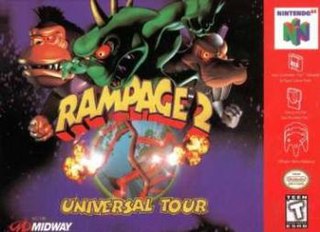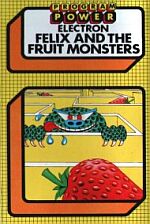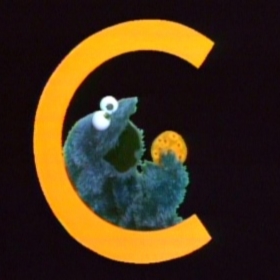
Mouse Trap is a maze video game developed by Exidy and released in arcades in 1981. It is similar to Pac-Man, with the main character replaced by a mouse, the dots with cheese, the ghosts with cats, and the energizers with bones. After collecting a bone, pressing a button turns the mouse into a dog for a brief period of time. Color-coded doors in the maze can be toggled by pressing a button of the same color. A hawk periodically flies across the maze, unrestricted by walls.

Jr. Pac-Man is an arcade video game developed by General Computer Corporation and released by Bally Midway in 1983. It has the same gameplay as prior entries in the series, but the maze in Jr. Pac-Man scrolls horizontally and has no escape tunnels. The bonus item which moves around the maze changes dots into a form which slows Jr. Pac-Man as they are being eaten.

K.C. Munchkin!, released in Europe as Munchkin, is a maze game for the Magnavox Odyssey 2. Its North American title is an inside reference to then president of Philips Consumer Electronics, Kenneth C. Menkin.

Super Pac-Man is a 1982 maze chase arcade game developed and published by Namco. It was distributed in North America by Midway, and is Namco's take on a sequel to the original Pac-Man; Midway had previously released Ms. Pac-Man, which Namco had little involvement with. Toru Iwatani returns as designer.

Rampage is a 1986 arcade video game by Bally Midway. Inspired by monster films, players control a trio of monsters: George, Lizzie, and Ralph, humans turned into creatures due to various experimental mishaps. The objective is to destroy cities and combat military forces while maintaining their health. The game is set across 128 days in cities across North America, with each cycle repeating five times. Gameplay includes destroying buildings, eating humans, and avoiding damage.
Munchers is a series of educational/edutainment computer games produced by the Minnesota Educational Computing Consortium (MECC) for several operating systems. The series was popular among American schoolchildren in the 1980s and 1990s and were the recipients of several awards. The two original games in the series were Number Munchers and Word Munchers. The brand name is currently owned by Houghton Mifflin Harcourt, but is defunct.

Rampage 2: Universal Tour is a 1999 action game developed by Avalanche Software and published by Midway. It is the third game in the Rampage series and a sequel to 1997's Rampage World Tour.

Pac-Man: Adventures in Time is a 2000 maze video game in the Pac-Man series developed by Creative Asylum and Mind's Eye Productions, and published by Hasbro Interactive, in collaboration with Namco. The game follows a formula similar to the original arcade game, while expanding on it with new features. In the game, Pac-Man travels through various time periods using Professor Pac-Man's time machine to recover pieces of an ancient artifact.

Do! Run Run, also known as Super Pierrot, is the fourth and final incarnation of Mr. Do!, the Universal video game mascot. Returning to his Mr. Do! roots, the clown has a bouncing powerball with which to hurl at monsters. Mr. Do runs along the playfield picking up dots and leaving a line behind him, which the player is encouraged to create closed off sections with. Precariously balanced log traps can be rolled downslope, crushing enemies. The resulting game is something of a cross between Mr. Do!, Congo Bongo, Pac-Man, and Qix.

Anteater is an arcade video game designed by Chris Oberth and released in 1982 by Tago Electronics. The player steers the tongue of the eponymous creature through a maze, retracting it when dangers approach. Though the arcade game was not a hit, it spawned a number of direct clones for home computers; Sierra's Oils Well became better known than the original. Oberth wrote an Apple II version of his own game for Datamost using a different title.

Snapper is a clone of the Namco arcade game Pac-Man programmed by Jonathan Griffiths for the BBC Micro and released as one of the launch titles for Acornsoft in 1982. It was also one of Acornsoft's launch titles for the Acorn Electron in 1983.

Felix and the Fruit Monsters is a video game written by John Chaytor and released by Micro Power for the BBC Micro and Acorn Electron in 1983. A sequel to platformer Felix in the Factory, it is a maze game resembling Pac-Man, but with different gameplay.

Munch Man is a video game written by Jim Dramis for the TI-99/4A home computer and published as a cartridge by Texas Instruments in 1982. Based on Namco's Pac-Man, it includes several variations that alter gameplay. Instead of emptying the maze of dots, Munch Man leaves a chain-like pattern as it moves, and the goal is to fill the entire maze. Dramis later wrote Parsec for the TI-99/4A.

Cookie Monster is a blue Muppet character on the PBS/HBO children's television show Sesame Street. He is best known for his voracious appetite and his famous eating catchphrases, such as "Me want cookie!" As his name suggests, his preferred food is cookies; though he eats almost anything, including inedible objects. Chocolate chip cookies are his favorite kind. His speech is often grammatically nonstandard; for example, he always uses "Me" to refer to himself in place of "I", "My", and "Mine". Despite his voracious appetite for cookies, Cookie Monster shows awareness of healthy eating habits for young children and also enjoys fruits and vegetables.

Munchman is a tabletop electronic game that was released under licence in 1981 in the UK by Grandstand. It is a rebadged version of the Tomy game known as Pac Man in the United States and Puck Man in Japan. The games are all based on Namco's Pac-Man arcade game and use a VFD screen.

The Munchables, known in Japan as Tabemon (たべモン), is an action-platform game developed by Now Production and published by Namco Bandai Games for the Wii video game console. The player controls the titular Munchables, creatures of insatiable appetite, who use their gurgitating prowess to consume enemies, which are known as "Tabemon Monsters", space pirates who have invaded the Munchables' home planet, known as Star Ving, and bear an uncanny resemblance to various foods.

Pac-Man 99 was a maze video game with battle royale elements developed by Arika and published by Bandai Namco Entertainment for the Nintendo Switch. It was released through the Nintendo Switch Online service on April 7, 2021.
















